|
|
|
Sort Order |
|
|
|
Items / Page
|
|
|
|
|
|
|
| Srl | Item |
| 1 |
ID:
162004


|
|
|
|
|
| Summary/Abstract |
RICHARD MAHER discusses the prospect of returning to a bipolar international system characterized by U.S.-China bipolarity. He argues that the consequences and implications will diverge in several respects from those that prevailed under the U.S.-Soviet bipolarity of the Cold War era.
|
|
|
|
|
|
|
|
|
|
|
|
|
|
|
|
| 2 |
ID:
132554
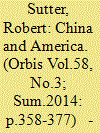

|
|
|
|
|
| Publication |
2014.
|
| Summary/Abstract |
While there have been many sources of tension in U.S.-China relations since the Cold War, they have been held in check generally by circumstances that have inclined the governments to cooperate. Yet, the relationship remains multi-faceted and fragile, and various frameworks and forecasts-like the contemporary "Great Divergence" framework, which speaks to the apparent disjunction between economic and security affairs-have proven to be incomplete and incorrect.
|
|
|
|
|
|
|
|
|
|
|
|
|
|
|
|
| 3 |
ID:
177821
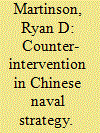

|
|
|
|
|
| Summary/Abstract |
The prospect of U.S. military involvement in a regional war looms large in Chinese naval strategy. This article examines the Chinese Navy’s evolving role in countering U.S. military intervention in a conflict over Chinese-claimed offshore islands. This role has both wartime and peacetime aspects. In peacetime, the PLA Navy serves a deterrence function, demonstrating China’s ability and resolve to fight the U.S. military if the U.S. were to intervene. In wartime, the operations of the PLA Navy would sit at the heart of any maritime campaign, helping to achieve China’s territorial objectives in spite of U.S. involvement.
|
|
|
|
|
|
|
|
|
|
|
|
|
|
|
|
| 4 |
ID:
184776
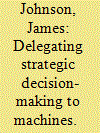

|
|
|
|
|
| Summary/Abstract |
Will the use of artificial intelligence (AI) in strategic decision-making be stabilizing or destabilizing? What are the risks and trade-offs of pre-delegating military force to machines? How might non-nuclear state and non-state actors leverage AI to put pressure on nuclear states? This article analyzes the impact of strategic stability of the use of AI in the strategic decision-making process, in particular, the risks and trade-offs of pre-delegating military force (or automating escalation) to machines. It argues that AI-enabled decision support tools - by substituting the role of human critical thinking, empathy, creativity, and intuition in the strategic decision-making process - will be fundamentally destabilizing if defense planners come to view AI’s ‘support’ function as a panacea for the cognitive fallibilities of human analysis and decision-making. The article also considers the nefarious use of AIenhanced fake news, deepfakes, bots, and other forms of social media by non-state actors and state proxy actors, which might cause states to exaggerate a threat from ambiguous or manipulated information, increasing instability.
|
|
|
|
|
|
|
|
|
|
|
|
|
|
|
|
| 5 |
ID:
132555
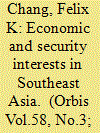

|
|
|
|
|
| Publication |
2014.
|
| Summary/Abstract |
Despite worries that ASEAN is becoming weak, the organization remains as strong as it ever was, given the parameters of its design. Its member countries still tightly embrace the organization's principles, the "ASEAN way." But simple adherence to those principles can be problematic. ASEAN countries, whose national economic and political interests collide, often appeal to the same principles to back their positions. That tends to pull ASEAN in different directions. Great power policies, particularly those of China and the United States, now exacerbate the situation. At the same time, ASEAN's reliance on multilateral consensus has made it difficult to reconcile real differences among its member countries or develop unified regional responses. That can be seen in issues from the Xayaburi dam on the Mekong River to the South China Sea. The ease with which ASEAN's principles can come into conflict and its consensus-driven decision- making can become deadlocked clearly marks the limits of the "ASEAN way."
|
|
|
|
|
|
|
|
|
|
|
|
|
|
|
|
| 6 |
ID:
049793


|
|
|
|
|
| Publication |
Selangor, Strategic and Security Studies(UPSK), 2001.
|
| Description |
13P.
|
| Series |
UPSK occasional paper; no.9
|
| Standard Number |
9832237092
|
|
|
|
|
|
|
|
|
|
|
|
Copies: C:1/I:0,R:0,Q:0
Circulation
| Accession# | Call# | Current Location | Status | Policy | Location |
| 044990 | 327.73051/SHA 044990 | Main | On Shelf | General | |
|
|
|
|
| 7 |
ID:
134075
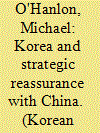

|
|
|
|
|
| Publication |
2014.
|
| Summary/Abstract |
Korea offers not only dangers and risks, but opportunities that could be useful in contributing to a mutual concept of strategic reassurance that Beijing and Washington, along with key U.S. allies like the Republic of Korea, should attempt to introduce into their relationship in a systematic way in the years ahead. The United States has now "rebalanced" toward the Asia-Pacific. But it needs a central organizing concept for what, together with allies, it will do in the region now that it is "back." Coordinating with China about how to handle, cooperatively, any possible major military scenario on the Korean Peninsula as well as the aftermath of any such scenario is a good place to start.
|
|
|
|
|
|
|
|
|
|
|
|
|
|
|
|
| 8 |
ID:
147046


|
|
|
|
|
| Summary/Abstract |
As China invests in its nuclear forces and U.S.-China relations become increasingly strained, questions of U.S. nuclear doctrine require greater attention. The key strategic nuclear question facing the United States is whether to attempt to maintain and enhance its damage-limitation capability against China. The answer is less straightforward than it was during the Cold War, because China's nuclear force is orders of magnitude smaller than the Soviet force was. Part of the answer depends on the military-technical feasibility of the United States achieving a significant damage-limitation capability: What would be the outcome of military competition over the survivability of China's intercontinental ballistic missiles, submarine-launched ballistic missiles, and command and control, and over the effectiveness of U.S. ballistic missile defenses? The answer also depends on the benefits that a damage-limitation capability would provide; these could include contributions to homeland deterrence, extended deterrence, and reassurance of U.S. regional allies. The final piece of the analysis concerns the potential costs of a damage-limitation capability, which could include increased escalatory pressures during crises and growing political tension between the United States and China. A thorough analysis demonstrates that the United States should forgo such a capability because the prospects for preserving a significant damage-limitation capability are poor; the deterrent benefits would be small; and the escalatory and political costs would be relatively large.
|
|
|
|
|
|
|
|
|
|
|
|
|
|
|
|
| 9 |
ID:
174051
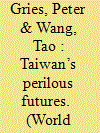

|
|
|
|
|
| Summary/Abstract |
The Taiwan Strait is heating up, as Mainland Chinese netizens, generals, and politicians increasingly talk about ‘forceful’ rather than ‘peaceful’ reunification. While Xi Jinping and Chinese nationalists desperately desire Taiwan’s reunification, Trump’s isolationist “America First” rhetoric has only encouraged reckless Chinese thinking about forcing reunification, and the Taiwanese remain largely passive, unable to confront an overwhelming threat. Wishful thinking in Beijing, Taipei, and Washington is increasing the odds of miscalculation. The 2020 presidential elections in Taiwan and the United States, and the ongoing U.S.-China trade war, furthermore, bode ill for peace in the Taiwan Strait.
|
|
|
|
|
|
|
|
|
|
|
|
|
|
|
|
| 10 |
ID:
148943


|
|
|
|
|
| Summary/Abstract |
This essay offers an insight into one of the most significant bilateral relations in modern world politics: the U.S.-and-China relationship. It argues that the United States, the world's most powerful nation, and China, a rising power, are heading toward cooperation rather than confrontation. In spite of differences between them, the United States and China have become highly interdependent and have sought to increase cooperation in various realms, namely economics, strategic issues (climate change, non-proliferation, and counterterrorism), education, and tourism. They will seek to avoid a mighty struggle for influence and make an effort to strengthen mutual interests and sector-to-sector cooperation. It is concluded in this essay that the United States and China can cooperate for the sake of their own national interests, and their cooperation is what the world appeals for. The analysis of the U.S.-and-China relations in this essay is based on the data obtainable from the United States and Chinese official bodies and on scholarly literature.
|
|
|
|
|
|
|
|
|
|
|
|
|
|
|
|
| 11 |
ID:
181715
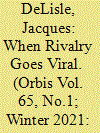

|
|
|
|
|
| Summary/Abstract |
Regional security and regional order in East Asia are shaped profoundly by the United States, the People's Republic of China, and U.S.-China relations. The COVID-19 crisis accelerated a negative trajectory in the relationship between Washington and Beijing. As with so many issues, here, too, the situation in the time of COVID is much like the status quo ante, only more so. The pandemic-related and pandemic-exacerbated problems in U.S.-China relations pose challenges for security and stability in East Asia. They do so in ways that several theories of international relations would predict. This is the first of a two-part series, the latter of which will appear in an upcoming issue of Orbis.
|
|
|
|
|
|
|
|
|
|
|
|
|
|
|
|
|
|
|
|
|